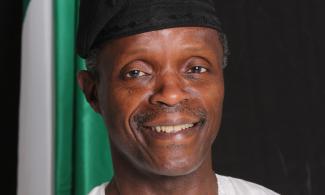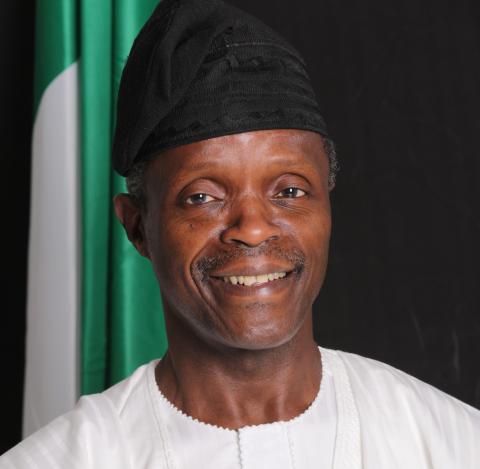
According to the Acting President, claims of marginalization are principally driven by selfish interests, which have given rise to false narratives.
The Acting President, Professor Yemi Osinbajo, has stated that Nigerian leaders are never divided by ethnicity or religion when it comes to stealing the country’s resources. Professor Osinbajo said this on Wednesday, in Abuja, at a seminar organized by the Institute for Security Studies. The seminar, which had “Unity in Diversity” as its theme, addressed the raging claims of marginalization by certain sections of the country.
According to the Acting President, claims of marginalization are principally driven by selfish interests, which have given rise to false narratives. One of such false narratives, he said, is that a single ethnic or religious group bears greater responsibility for the country’s challenges or that one is superior to the other. In challenging the version of events, the Acting President said his experience is that Nigerian leaders are very united when it comes to looting the treasury.
“I have found and I have repeated this several times that whenever you look at a charge sheet, that is a sheet where people have been charged with an offense, especially those who have served one way or the other in the Federal Government of Nigeria; charged with stealing or corruption, you will never find one ethnic group alone represented. You will always find an equal representation of the ethnic groups. There is complete unity in this business of stealing. You will also not find one religious group, you will find that there is nobody arguing about religion when it comes to these matters,” he said.
To support his claim, he added that the country has triumphed only in instances where attention was not paid to religious or ethnic differences. For example, said the Acting President, there is no focus on religion and ethnicity when the country’s football teams take to the field. The collective goal, he explained, is the outcome of the match. He advised Nigerians to extend that attitude to every aspect of national life.
“I want to say that that is exactly where we should be as a nation today. We should just be telling ourselves – just win, just score; it does not matter where you are from so long as you are in government or wherever you are, just win for this nation and we do not want to ask questions of where you are from,” he counselled.
Professor Osinbajo also challenged the view that countries cobbled together, like Nigeria was, are doomed to fail, describing holders of the view, especially those describing the country as a “mere geographical expression” as pseudo-intellectuals.
“Those who say so do not know that even the expression, ‘mere geographical expression”, used in relation to a country was not first used in relation to Nigeria. As a matter of the fact, it was the German statesman Klemens von Metternich, who used this same expression for Italy. He simply summed up Italy as a mere geographical expression exactly a century before Nigeria was born. Italy is still a mere geographical expression, but still a nation. So, we must not be misled by those in some pseudo-intellectual way suggest to us that the mere fact that we did not deliberately, one day, hold a conference to come together means that we should not or cannot stay together. Indeed, we can,” he argued.
He equally contended that most countries of the world came together by some accident of history or forced to be together, adding that the wise ones among such have decided to remain united.
The Acting President warned that it is a false assumption that an ethnic group is better taken care of if one of its members runs the government, saying the country’s experience has shown that no ethnic group has necessarily fared better socio-economically because one of its own is in power.
“There is no fact to support that whatsoever and that is how it has always been,” he argued.
He warned that those who level charges of marginalization against other sections or religion do not do so out of selfless love for their areas of origin. He explained that when people from certain zones say their zones have been marginalized, what they are saying is that they should be given government appointments because they hail from one zone or the other.
“Whenever people make these charges of marginalization, it is usually self-serving. I sat with the President once when two members of the National Assembly came to him and said we, referring to states in the North, have been marginalized. They went on to explain why. They mentioned some states had no senior ministers. One of them said: ‘Kaduna had no senior minister; the only minister is the minister of state’. He mentioned also Sokoto, even Katsina. Then he mentioned another group and he said, all these people have senior ministers, some groups in the South have senior ministers,” he recalled.
Professor Osinbajo said he responded before President Muhammadu Buhari responded, telling the federal legislators that there was no consideration, at the time the appointments were made, about whether or not they wanted to appoint a senior minister from one area or the other. His response, he said, was not well received by the National Assembly members. The Acting President reasoned that if one looks at any particular situation, one can invent a narrative to suit a personal or sectional agenda.
Once, he said, he was visited by a group, which complained that being a pastor, he should be taking care of the country’s Christian community. The group, he said, told him that the cabinet was loaded with Muslims to the disadvantage of Christians. When the group’s claim was put under scrutiny, revealed the Acting President, it was discovered that there were two more Christians than Muslims in the cabinet, which currently has one more Christian than Muslims.
Professor Osinbajo said he was astounded by the development, which he said also aroused suspicions in him that many of those pushing religious agenda have no commitment to their faiths.
“The impression is that the moment a person is appointed, it is almost as if these are militants for their religion. Many of them do not even subscribe fully to their faiths in any way,” stated the Acting President.
Professor Osinbajo rejected the view that that hate speech is part of freedom of expression and should be condoned. He warned that condoning hate speech will be a grievous error by any group of people. According to him, every major catastrophic human conflict, including of the genocidal variety, was sparked by hate or extremist ideology, especially hate speech.
“We must do something about hate speech; we must control hate speech and we must insist that it is not acceptable at public discourse of any type whether it be on radio or social media. We cannot allow the promotion of hate speech,” he stated.
He pointed at the sentencing of media owners to lengthy prison terms by the International Criminal Court for the promotion of hate speech, which led to the Rwandan genocide in April of 1994.
In response to the clamor for the dismantling of the country, Professor Osinbajo none of the parts being proposed as stand-alone nations can be as viable as Nigeria, even if they survive.
“None of them would be more viable, none of them can be as successful as a country such as this coming together. The other day at the AU (African Union), I was listening to some of the comments from several African leaders and I was whispering to the gentleman next to me that Rwanda is one of those countries that is celebrated for good governance, celebrated for a few things and even its economy. But when you compare the entire Rwandan economy, you will find that Lagos’ economy is six times bigger and Lagos is just one state of out 36 states,” he said.
The Acting President said he has continued to state this view everywhere he has gone. He argued that by its population, size of its market and combined resources, Nigeria’s potential is even far greater than the potential of most countries of the world.
He called on Nigerians to be courteous to one another in words and actions, so as to ensure that passions are not inflamed in a way that could lead to insecurity. He also stated that the country needs to social justice seriously, adding that poverty is a ready recipe for a variety of social problems.
“Very many poor people mean that there is a pool of individuals, who have no stake in society, and so it is our business to ensure that people have a stake in society.
"I think that we have a duty to ensure that we deal seriously with issues of poverty and social justice. That is why for the first time in the history of this country, when we were thinking through budgeting, we looked at the questions of social interventions and the social investment programs,” he explained.
The total outlay for social investment in the 2016 budget and in the current budget, he said, is N500 billion, which is the largest single item in the budget. Allied to social investment in promoting social justice is the fight against corruption. Professor Osinbajo described corruption as possibly the worst evil Nigeria has experienced or will experience, saying it is the single reason that resources are not evenly distributed.
“The fact that someone cornered the resources for themselves is what accounts for where we are today, economically. I think that we understand it for what it is. Many a times, people find excuses of every kind to excuse corruption and it is so for religious leaders, political leaders who look for all sorts of reasons to justify corruption. Someone is taken to court and they say the reason he is taken to court is because he belongs to another political party. Why don’t we ask the question, did he steal? If he did, then he should be in court anyway, there must be justice. That is the first question we must ask,” the Acting President reasoned.
While admitting that the country has made mistakes, Professor Osinbajo said those wishing for a replay of the three year-civil war that the country fought in the 70s are ignorant of its harrowing effects.
He noted that those who witnessed the war will not wish its horrors on their worst enemies. The Acting President added that those who only read or heard stories about the war have no sense of how it was and are largely responsible for the incendiary statements that are currently the fad. He advised Nigerians to remember that a repetition of the tragic mistakes that led to the war would be catastrophic for the country.
